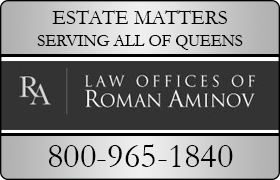Cambria Heights Real Estate Lawyer, New York, page 2
Sponsored Law Firm
-
 x
x

Click For More Info:
-
The Law Offices of Roman Aminov
147-17 Union Turnpike Flushing, NY 11367 » view mapElder Law, Probate, Estate Planning Free Inital Phone Consultation
The Law Offices of Roman Aminov is a client centric trusts and estates practice concentrating in estate planning, elder law, and probate.
800-965-1840  Roman Aminov
Flushing, NY
Roman Aminov
Flushing, NY Attorney At Law - New York, 2011
 Testimonials
Testimonials"Roman went out his way to help me. He made several attempts to contact me."
 Contact UsEmail or Call 24/7
Contact UsEmail or Call 24/7Call for free initial consultation,
800-965-1840.
Bruce A. Blakeman
Banking & Finance, Estate Planning, Family Law, Real Estate
Status: In Good Standing
FREE CONSULTATION
CONTACTTanya Hobson-Williams
Accident & Injury, Estate, Real Estate, Business
Status: In Good Standing Licensed: 28 Years
Austin I. Idehen
Real Estate, Immigration, Estate, Divorce & Family Law
Status: In Good Standing Licensed: 29 Years
Hal R. Ginsburg
Construction Liens, Complex Litigation, Arbitration, Collection
Status: In Good Standing Licensed: 41 Years
Joseph N. Misk
Commercial Leasing, Commercial Real Estate, Defamation & Slander, Condominiums
Status: In Good Standing Licensed: 33 Years
James T. Murphy
Construction, Criminal, Corporate, Contract
Status: In Good Standing Licensed: 40 Years


 Testimonials
Testimonials Contact UsEmail or Call 24/7
Contact UsEmail or Call 24/7
